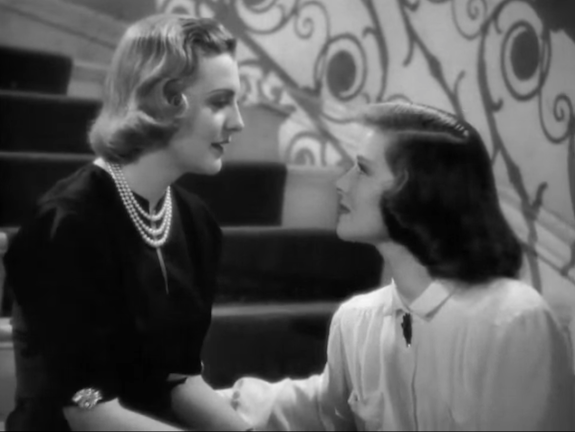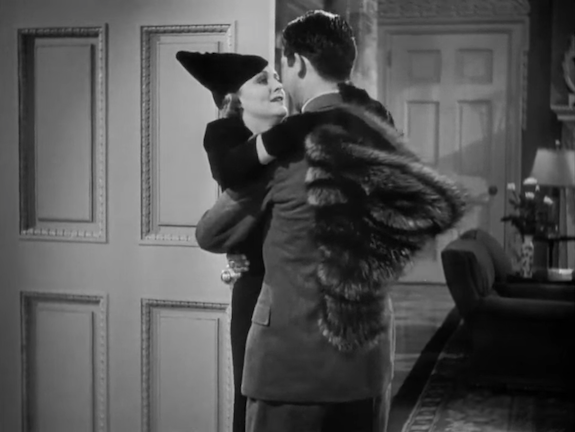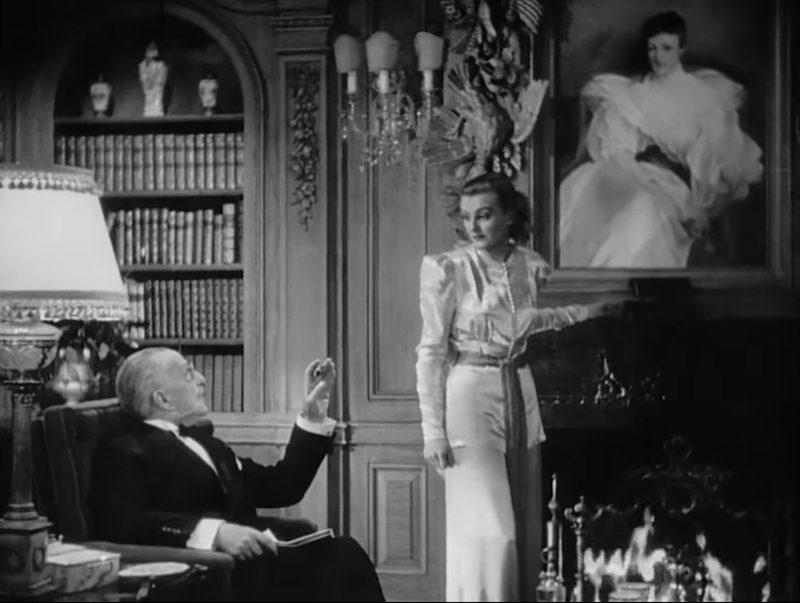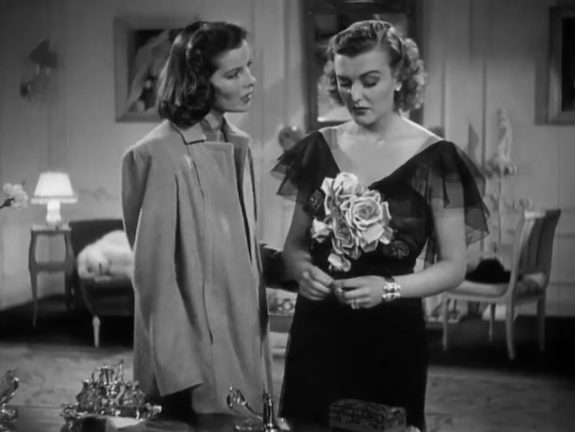Before each Smackdown, Nick Taylor highlights alternates to the Oscar nominations for Best Supporting Actress...

I’ve written about a lot of movies for this series that have meant a great deal to me, both because I love them and because they are very, very good. With only three events left in this current Smackdown season, I think I can safely guess that I will not be writing about a film that has touched me quite as dearly as Holiday has. Along with being an indisputable peak in classical Hollywood filmmaking, in the romantic comedy genre, in the careers of its directors and its leading couple, the film is also a deceptively sharp ensemble feature. To say any performer matches the heights Katharine Hepburn and Cary Grant reach would be hard to argue, but to call Doris Nolan's savvy, multifaceted supporting turn as the character who kicks the whole plot into motion a sterling achievement all its own is a claim I'd be very happy to make...
Our story begins with Johnny Case (Cary Grant), a self-made man in New York who returns home from the first vacation he’s taken in his life with news that he’s engaged to someone named Julia Seton (Doris Nolan). Much to the surprise of his friends Nick and Susan (Edward Everett Horton and Jean Dixon), Johnny knows almost nothing about his bride-to-be, and is trusting their compatibility at Lake Placid will withstand any obstacles the world might throw their way. Still, this doesn’t prepare Johnny for his discovery that Julia Seton is actually part of the Seton dynasty, currently headed by business-savvy patriarch Edward (Henry Kolker). Julia also has a younger brother named Ned Jr. (Lew Ayres), who’s become deeply cynical under the pressure of his father’s expectations, and an older sister named Linda (Katharine Hepburn), who’s as put off by the family fortune as Ned but is instead kinetic, intelligent, and painfully optimistic.

No, I can’t imagine anyone would doubt for a second that Grant’s prankish, idealistic Johnny would end up with anyone but Hepburn’s vivacious, quick-witted Linda, each of whom gives one the greatest performance of their careers. Yes, the broad strokes of Johnny’s rebellion against the bottomless capitalism of Mr. Seton is the kind of work/life dilemma that many a Hallmark movie has flimsily reconfigured into having a job you love vs empty careerism. What elevates all of this is that Holiday is extravagantly interested in revealing its characters through the specific contexts John Barry’s script has devised for them. Everyone remains exactly who they were from the moment they first walked on screen, but our understanding of them as full, complicated human beings only grows with each scene. Director George Cukor also lends real gravity to Holiday’s conversations about duty and money. Johnny’s dream of retiring in adulthood so he can enjoy life while he’s still young is both an entrancing, romantic dream, as well as a severe refusal of the kind of wage-slavery Mr. Seton aspires to and encourages in his children, each of whom have responded to his philosophies in their own way.
Nolan’s performance resides at a tricky crossroads between Holiday’s humanistic impulses and its questions of personal freedoms versus institutional loyalties. Holiday isn’t interested in giving a “reason” why Julia will eventually fall out of Johnny’s favor, and Nolan follows suit. From her first scene, walking in on Johnny marveling at the sheer size of her family’s mansion, Julia emerges as a luminous, credible romantic partner in her own right. She gets about as great an entrance as any human being is lucky to get, sweeping her arms around Cary Grant and embracing him in a long, passionate kiss. Both actors seem completely devoted to each other, but even at their most impassioned they still delineate between when they’re connecting to the bliss of their time at Lake Placid and when they’re seeing entirely new sides of each other. Julia is almost bashful at his awe of her enormous wealth, and a bit surprised by some of his methods for declaring that awe, like hollering in a living room to hear the echo (granted, it’s quite a living room). She also conveys a steely but undemonstrative certainty when she declares him to be a future multimillionaire as part of her father’s business, and seems quietly incensed at his own declaration that he has no intentions of doing so. They don’t come across as soulmates, but as committed, enamored individuals who are going to have to decide how their principles will mesh together once they get married.

That being said, everyone has a different idea about whether Julia and Johnny will actually go through with their engagement. Linda is certain Julia will choose him, now that she’s finally faced with such a dashing, wonderful embodiment of so many of the ideals Linda has championed all their lives. Ned has no faith in her, though his blanket cynicism makes him a slightly less appealing source of wisdom. Nolan doesn’t work to foreshadow Julia’s decision, maintaining a rich sense of personality while evoking real history with her co-stars. She connects with the script’s cleverness and Cukor’s warmly melancholic tone, giving Julia the same crackling wit as Linda but replacing Hepburn’s gutsier energy with a sense of someone who’s always in control of their emotions. She knows what it means to be a Seton, and strives to fulfill that obligation with a sense of purpose and propriety that aligns her with her father more than either of her siblings. Julia also matches John’s pragmatism and sense of obligation, even as it becomes clearer he isn’t built for the high society rituals Julia thrives in. You can see in both cases why they’d keep trying to find common ground, even as the gulf between their own ambitions grows further apart. It’s even more remarkable that Nolan is able to convey all of this through a clarity in voice and posture, delivering her characterization almost exclusively in profile to the camera.
What Nolan ultimately achieves is akin to Anne Baxter in All About Eve, playing an emotionally articulate woman while carefully sustaining the central tension of where her priorities ultimately lie. She does this in a far more peripheral role, minus the more conspicuous aura of mystery and duplicity that quickly cultivates around Eve. Julia is fundamentally the same woman at the end as she was when we first met her, but when she finally confirms whether she’ll go through with her marriage to Johnny, we’ve learned so much about both of them that it’s a wonder they ever seemed compatible. And yet, it’s a tribute to Holiday that the fissures in their relationship prompt real curiosity about what made them convinced to get engaged during that vacation at Lake Placid. What does this fantastically impulsive gesture say about Julia, who seems so swayed by Johnny’s romanticism and high ideas even as she’s largely resistant to how he displays these traits back in the world? How will this ordeal influence what she’s looking for in future partners? What is she going to say to Linda the next time they see each other? Her final rebuke, rendered with an acute awareness of how badly the past few days have gone, is so bitter that we cannot blindly discount her fate even as we relish in John and Linda sailing off into the sunset. It’s an unexpected last note from this character, but like so much of Holiday, it’s an insight that Cukor and his artists have been building towards without our noticing.
